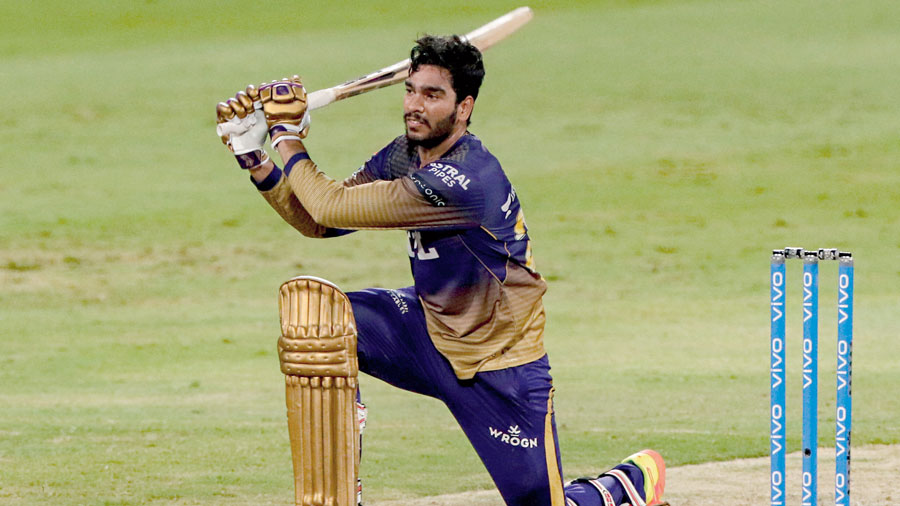The Kolkata Knight Riders inexplicably collapsed but recovered just in time to qualify for the IPL 2021 final with a heart-stopping three-wicket win over Delhi Capitals in Sharjah on Wednesday. They play Chennai Super Kings in the final in Dubai on Friday.
The way the Knight Riders plunged into the depths of uncertainty, it seemed as if it was some sort of bungee jumping going on and not cricket.
Chasing a 136-run target, they cantered to 123/1 and then suddenly slipped to 130/7. Four of their batsmen, from No.5 to No.8, were out for ducks. Call it madness or the unpredictability that T20 cricket thrives on, the scene in Sharjah was nothing that anyone could have ever thought of.
Before the 17th over of their chase, the Knight Riders needed 13 off 24 balls to win Qualifier two. But the next three overs saw 6 runs being scored at the cost of three wickets. That brought the equation to 7 runs needed off the last over.
Ravichandran Ashwin was given the ball by Delhi captain Rishabh Pant and the spinner twisted the story further by dismissing Shakib-al Hasan and Sunil Narine off the third and fourth balls of the over. With 6 needed off the last two balls and Delhi hoping to pull off of an unthinkable victory, Rahul Tripathi (12 not out) launched the fifth delivery straight over the bowler’s head for a maximum.
While the winning runs breathed life into the Knight Riders’ camp, there was absolute heartbreak in the Delhi dugout. Coach Ricky Ponting stared blankly at the ground from his seat while young captain Pant seemed devastated.
The Knight Riders need to balance their aggression better. When singles can win you the match, going for unnecessary sixes and losing wicket after wicket is not wisdom. It’s suicide.
Openers excel
The chase should not have been so tough for the Knights after openers Venkatesh Iyer and Shubman Gill thrashed Delhi’s bowling left, right and centre to share a 96-run stand in quick time.
Iyer was the aggressor of the two. The left-handed batsman, who also bowls right-arm medium pace, has been the find of this IPL. He is fearless with his approach and complements that with good timing. Iyer, who was dropped on 23 by Rabad, scored 55 off 41 balls, his third half-century of the season.
Gill played the anchor’s role to perfection, playing a run-a-ball innings of 46.
But the rest of the Knights batters had a nightmarish outing and it is better if they quickly forget this performance before the final.
Powerplay matters
The very first over of the match foretold the story of the day, that the Knights would dominate the game. It did not of course carry any hint of the dramatic finish that the match saw.
The Knight Riders chose to start with Shakib and he conceded just one run against Delhi’s aggressive and successful opening duo of Prithvi Shaw and Shikhar Dhawan. An even more significant fact was that Dhawan needed eight balls to get off the mark.
Not that Delhi were not trying to break free of the shackles. Dhawan (36 off 39 balls) launched Narine for consecutive sixes in the Caribbean bowler’s first over. The attempt was obviously to not let the spinner dictate terms.
But despite all that, Delhi could manage only 38 runs in their Powerplay, losing the wicket of Shaw (18). On wickets like the one in Sharjah, the Powerplay overs assume even greater importance. Whoever wins the Powerplay, gains an obvious upper hand in the game.
Poor strategy
Delhi also erred in sending Marcus Stoinis in at No.3. The Australian all-rounder was playing his first game in a long time after being sidelined by injury and one wonders if it was a wise move.
It perhaps would have served Delhi better if Shreyas Iyer, or even Shimron Hetmyer, batted at No.3. With the wily Ponting in the dugout, one expected better planning from Delhi. Stoinis struggled during his stay at the wicket, managing 18 runs from 23 balls, further complicating Delhi’s cause.










